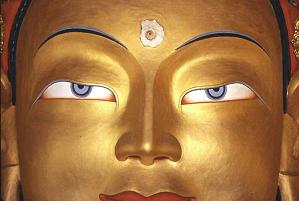The Buddhist Practice of Patience
In Buddhism, the word khanti (Ksanti in Sanskrit), which is translated as ‘patience’ is also the word that gets translated as ‘tolerance’. It’s not just a grin-and-bear-it thing. It’s essentially the faculty that allows a person to stay in a positive mental and emotional state when faced with unpleasant circumstances.
The ancient Buddhist art of staying happy when things suck big time.
It is one of the 6 ‘perfections’ (‘paramitas’) that one must develop in order to be a bodhisattva (which is a highly-realised being in the later ‘Mahayana’ Buddhist tradition). So training in patience is pretty key.
As well as developing patience in general, the Buddha specifically mentioned 3 things that we need to try to cultivate patience with – I guess because they’re the things that tend to annoy most people:
1. Illness
2. The weather
3. Other people
2. The weather
3. Other people
That list always makes me chuckle. I would add unpleasant smells to that list. And bad music blasting out of headphones in train carriages. But I suppose they didn’t have headphones in ancient India (or train carriages).

Here are some tips, mostly from Santideva’s Bodhicaryavatara – ‘Guide to the Bodhisattva’s Way of Life’. I’m writing this on the train and from memory, but hopefully it’s pretty accurate. Feel free to correct any mistakes!
- Don’t try to get everything in your world right. Try to get your mind right. Santideva says ‘Why try to cover the entire world in leather, when simply covering the soles of your own feet will do the job just as well?’
- Try to remember that, even though the person in front of you is being an asshole, you are also contributing something to your current feeling (and there are a bunch of other factors that you’re not taking account of too). How tired you are, the weather, the fact that you’re late, perhaps you woke up 10 minutes late and now have to rush. It’s all part of the web of conditions that led to you currently feeling like this.We tend to lay a whole bunch of blame on people, when often a bunch of the problem is dues to non-human causes and conditions. But you can’t shout at lateness, whereas you can shout at a person.
- Remember that the person has a whole story that you aren't aware of. If you knew it, maybe you’d give them a break?
- Although in your world you are the subject and they are the object, in their world it’s the other way round. We tend to see ourselves (emotionally, if not philosophically) as the centre of the universe. We are the constant, the star of the show. Everyone else is a bit part – passing through. But you’re just a bit part in their life too. When you get your head around that, their lack of consideration becomes a little more understandable.
- Your enemy is your greatest teacher. You are fortunate they exist. That might seem strange, but think about it. When nothing and no one is rubbing you up the wrong way, you just drift through life, learning very little. We've all met people who are the result of this kind of ‘good fortune’!
We reflect most when something’s not right and we have to work out a way to deal with it. Learning to stay positive when things aren’t right is the big one. When you’ve cracked it, life is a piece of cake!
No comments:
Post a Comment